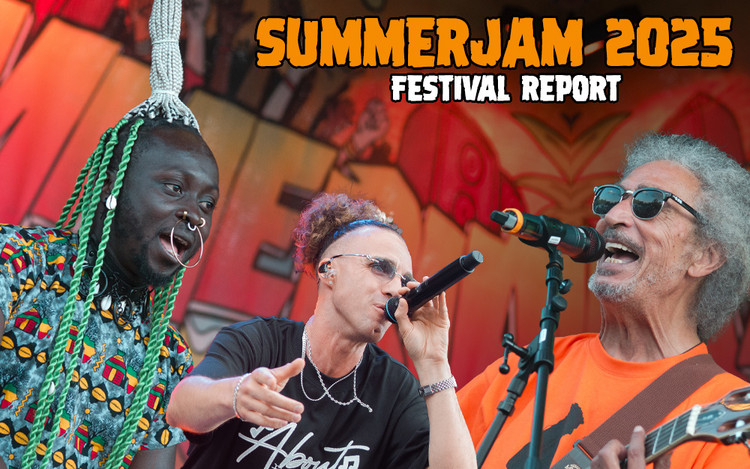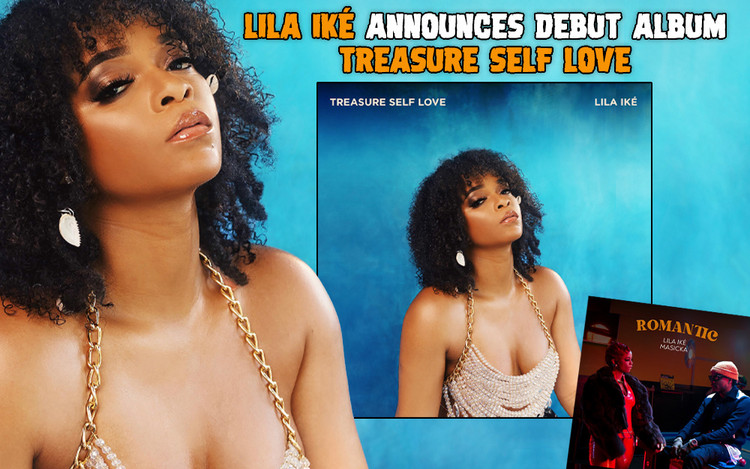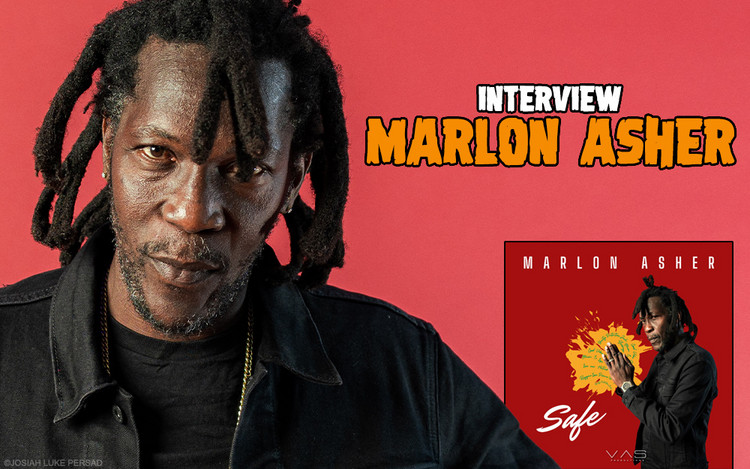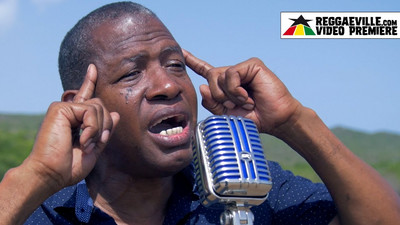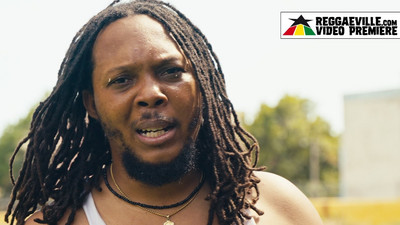Ras Muhamad ADD
Interview with Ras Muhamad
07/29/2014 by Justine Amadori Ketola
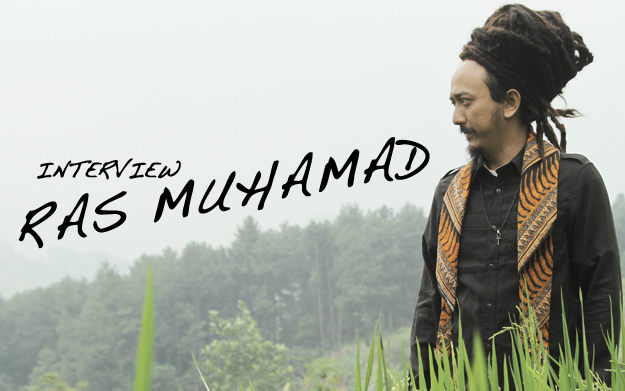
Reggaeville connected with Ras Muhamad in his native Jakarta, Indonesia. It was a late Ramadan evening for him, when as he explained people tend to be more nocturnal. We discussed the release of his third album Salam, clearly timed to coincide with the birthday of Emperor Haile Selassie I on July 23rd. The vision he has on this album is to project an Asian artist to more of a global level. A true Ras and scholar, he shares his insights as a musician and as someone who has reached celebrity status there, despite his humble personality. Ras Muhamad doubles as a reggae radio DJ and can be heard on the privately-owned pop station mustangFM.com out of Indonesia.
The album is a great concept, I noticed the language, mixing English and your native Bahasa Indonesia seems to be created with the intention to teach people, as in the title song, Salam, meaning peace. How does this material compare to your two previous albums, in terms of the language?
It happens very often, almost all my material has Bahasa Indonesia in it, maybe like some English in 4 bars or so. This Salam album is the first that I published that has this much English in it.
Indonesia is an island country, made up of over 1,000 islands, do you think that reggae comes into the culture because of this islandvibe? Its is predominately Muslim, but is also a very complex culture in terms of all the different tribes and languages.
That’s the thing about Indonesia, we are very diverse we are very complex also, and I think that it speaks to us and many different cultures also. The magic of reggae music is that it can almost adapt to any culture. You can find artists like Alpha Blondy or Tiken Jah Fakoly from Ivory Coast, you can find traces of Islam, traditional African beliefs in it. That is the beauty of reggae music, I never see it as preachy or religious, it can somehow unite people and people can understand and find common ground and similarities. That is why Indonesia love reggae music because it speaks to us, especially the poorer class. When Bob Marley sings Get Up Stand Up people just go off because they can understand what Bob Marley was speaking of.
You are seen on streaming video performing in front of thousands of people. You are basically like a national pop star there in Indonesia, is that a fair assessment?
Yes I am at a celebrity status in which I don’t like to be in. I mean there are good sides in which I am doing reggae culture, I want to show how reggae culture is, strengths of it and stuff. One of the downsides of it is, the little thing is, people taking pictures are a bit annoying sometimes, I get asked too many times.
When you release an album, do you release through regional distributors for CD’s, or are you independently releasing music?
I have been independent since 2007 I have released three albums here and one book that included a single inside of the book.
What is your book, Rainbow Country or Negari Pelangi about?
The theme was based on when I went to Ethiopia in 2012. Call it a pilgrimage, about a decade long, of Bob Marley’s songs, Peter Tosh songs, that have the roots and culture message. I always imagined what Ethiopia would be like. Being there was such a blessing because I learned so many things and it started off as my journal, writing it on line after I finished my trip to Ethiopia. Then the ambassador of Indonesia that is posted in Addis Ababa, he told me why don’t I make it into a book so it came from there. It is a mixture of a personal journey of what I thought and also the Rastafari movement, also trying to teach again in Indonesia what does “red, gold and green” mean and why is there the Lion of Judah and also the history of Ethiopia. Also Indonesia’s relationship with Ethiopia itself because in 1955 we made the Asia-Africa conference and Ethiopia was present here and after this we made the Non-Alignment Movement when President Sukarno met Emperor Haile Selassie I. So I just want to show them we have similarities in the revolutionary spirit of reggae music and also Rastafari, it is not something that is foreign if they think about it.
Why was there police activity when the book was launched in 2013? There is a song on the Salam album, Through The Smoke that addressed this incident.
It was an isolated incident, we were at a venue, and on my part, the mistake was that we miscalculated how many people would come, cause it was also supported by my radio station. Last time we did an off air show it was maybe 2012 and you can fit about 500-600 people, but then it came about over 1000 or something like that. The management of the venue panicked, she dated this policeman, she said, “break it up, break it up”, so without following any kind of procedures, he just shot teargas inside the place. We had reporters, my parents, my friends parents, it was pandemonium, bananas. But that is the thing though that made me really, very emotional because when that happened, all the policemen disappeared and we had to break up everyone in the crowd and they broke up and they went home in peace. It could have been done much more peacefully.
The music unites the people. Indonesia operates as a functional democracy and people know their rights in terms of voting and they areliving under a fairly strong economy but yet there is still some disparity between the classes.
The big social gap is still there. In Jakarta you can tell, you have this huge metropolis and you have the upper middle class living a very affluent and luxurious lifestyle and on the other hand, just a half a kilometer away you have so many ghettoes and things like that. 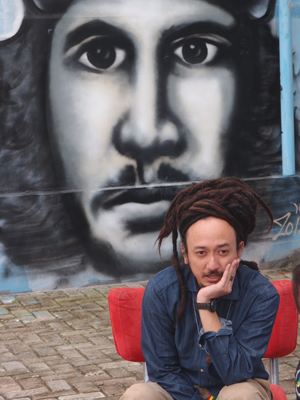 You spent 10 years in New York, what is your experience of reggae there, was it a breeding ground for your music?
You spent 10 years in New York, what is your experience of reggae there, was it a breeding ground for your music?
Yes, during my early childhood and early adulthood, from 1993-2005. It was very much so, my first exposure was with my cousin, he loves dancehall culture and the first music I heard was Buju Banton’s Champion and Terror Fabulous Action and I was into hip-hop music. It sounded like hip-hop but not hip-hop, I tried to pay attention to the lyrics. I was like ‘What is this?’ He was like ‘This is reggae music.’ My first exposure was not Bob Marley as many tend to have as their first exposure to reggae. My first exposure was dancehall and I just fell in love with it, the same way I fell in love with hip-hop music when I came to New York. Then afterward, I just immersed myself with Jamaican music, hip-hop music, any kind of music. In 8th grade, I grew my hair, I dressed in black, I listened to heavy metal, I still listened to hip-hop and reggae, any kind of music. My influences were Wu-Tang, Mobb Deep, for reggae it was Buju Banton. I think about 1997 my Mom went to Jamaica for a business meeting and she brought me back gifts from the island. She brought back a Bob Marley CD - it was Legend and I fell in love with roots reggae.
Your lyrics use some deep Jamaican patois for the English segments, how did you become so well-versed in patois?
I think it is an experience, as in my college years, 2000 and up I went to a community college where there were a lot of Caribbeans, they took me under their wing and took me to a lot of sound systems, and like that, and when they would speak I would always try to figure it out. Slowly I caught on, slowly I tried to reply to them in patois, and slowly it kind of stuck on to me. I think I have an advantage or a capability, I pick up accents veryeasily, sometimes I forget to pronounce things in a New York way, I pick it up very fast. It is part of my personality I guess.
What community college was that?
It was Borough Manhattan Community College.
How did you get your start as a performer and getting it figured out, and pursue your career, were your parents supportive of your choice?
My parents were very supportive, when I told them that reggae music stands for this and when I told them the values of it they totally supported it. My mom is a big reggae fan now, she tries to go to my shows often. I have been performing live since I was 14 or 15. I was on junior high school I had a band and it changed to many bands, and we always try to create our own music, our own sound. I had a metal background and still into reggae music and hip-hop and still trying to incorporate it. But then performing all those years, I experimented on different music and tried to focus on hip-hop but there was still something missing I guess a natural process. I always call it that reggae music called me to be in reggae music, it chose me and my heart and soul and how I express. I have total freedom to express in reggae music and its message.
The song Leluhur on the album uses traditional Indonesian instrumentation in the reggae mix, what is this instrument and how did you record this, was it an overdub there in Indonesia?
Leluhur is very special, because of all three of my albums, I always make it as a bit of a purist, I always have that principle, it needs to be made on a Jamaican rhythm. This is the first time that I used Indonesian instruments. I take it is at the first reggae album I am hoping the world will listen to and I want them to know that this comes from Indonesia, I want to show them the language. There are 5 to 6 instruments, We have the kundung, like the Javanese kundung, the gunai is that really high pitched sound, that is the Sumatran one, they use it for martial arts, it was a form from India, a smaller one, like the one with snake charming.
When you decided to do an album this time you went with the Oneness crew from Germany so they produced the rhythms, or you collaborated, how did the production for this album come about?
Most of the rhythms are produced by Oneness. They sent me over 100 rhythms, and I chose 14 of the best ones that I can voice and speak my opinion and express on. Coming back to Leluhur, it was really an exclusive rhythm, where I came back to Morry one of the producers from Oneness Records and said that we should take the opportunity to make something that is really authentically Indonesian, and he said, ‘OK’. So I had the idea of finding the chords on keyboards and he said, ‘Oh we can work on this.’ So he put the layers and overdubs on that you could say the Western or the modern instruments, like keyboards and drums and organs and he sent it back to me and we added the overdubs for the Indonesian instruments. That is why Leluhur is very special.
What is the live music scene like for you there, do you perform often? Do you have a regular band that you rehearse with?
We are about a dozen-man team. I have my own backing band, called Easy Skankin Band, with six players and four crew. When it is not Ramadan, Ramadan is the most chill time, I have no gigs at all, I have three to four gigs every single week. It could be anywhere, in Jakarta, I have a gig on TV in the morning, the last gigs that we did I played three times, in one day, at 4pm, 7pm then 11pm. We were really grateful for that. There is a large and wide audience for reggae music, the enthusiasm is really there.
As compared to other genres is it the same, as say metal or pop music that gets a lot of exposure in the media, it is the same, it is a part of pop music in Indonesia?
Yes, very much, it is crazy how reggae music has become so wide and large in the last five years. You can hear reggae music everywhere, whether its Indonesian reggae music, or Jamaican reggae music. At five in the morning to go to the airport, and I pay my highway fare, and the guy is listening to reggae music, he’s listening to Stir It Up while I am listening to Bob Marley.
We could talk about this reggae revival, but in terms of what you have done, you have really helped bring reggae to the forefront there. Kabaka Pyramid has been an a artist working on this revival in Jamaica and has played animportant part. You have done this beautiful collaborationwith him on this album, in the form of “Re-Education”, it makes so many interesting correlations between east and west and ancient teachings, howdid you two write this song together? What was the recording process like?
The process was for me, I am never about business, for me its just about linking up people, so the first time I got introduced to his music was on the Reggaeville Riddim project, the mega project, big up Reggaeville. First time I heard him he sounded different than everyone else, I thought, ‘This guy sounds like an MC', at the end of the bars he always ended not just in a single syllable, he ended in multi-syllable. It was like ‘OK, this is something fresh, this is something cool’. Then we linked up on Twitter, I think it was just on one of my radio shows I was doing, he was following me already, and we always shared knowledge maybe through Facebook or Whatsapp, about Kemetics or ancient Egypt cause you know he is very scholar-like, and I have a deep interest into that because it comes back again to Indonesia. How come ancient Indonesian cultures have similarities to ancient Egypt, and ancient civilizations weren’t isolated from each other, we communicated with each other. People would think, ‘It’s so hard during ancient times, because you have the primitive technology, but for instance with the Borobudur (pyramid of Indonesia) archeologists are still baffled, like ‘how did they build this?’, the same as the Giza pyramids, you have mummies also in Makassar (Indonesia). So we want to put all that together, as education, as a song of self-knowledge, like learning things besides conventional academics. It’s trying to push that we basically come from one place, we can find traces of cultures back, I could say, ‘forward’ to Africa. 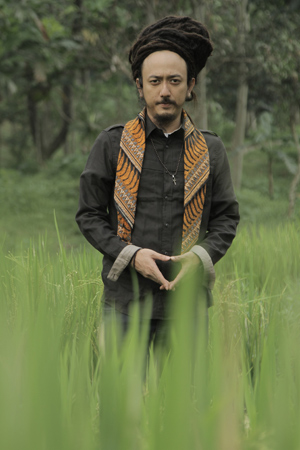
First time I approached him it was the middle of September 2013. Because I had another bunch of rhythms from the One Drop band. One Drop band is the band of Uwe Kaa, It was their second time playing here in Indonesia, the guitarist from the One Drop band said there were ‘new rhythms, about thirty rhythms, would you like to listen to them?’ I said, ‘Yes, please, it might go on the album.’. One of the rhythms just struck me, its called the Girlfriend rhythm, I know it doesn’t sound very…but it has very strong vibes. I sent it to Kabaka, and he said, ‘Would you like to do a combination for the album?’ He said ‘Yes, but give me some time.’. Because at the time he was preparing for the Lead The Way EP. So I worked on it first, he knew before as I told him what the song was going to be about. I wrote the lyrics and I sent it to him. Then he was finished in about January, and then overdubs were laid. We just had a difficulty with the sample intro. The sample intro that you hear now, the Malcolm X speech, wasn’t the original idea, my idea was to sample Nas & Rakim because they had some lyrics that I heard ten years ago that just resonate with me and one of them, Rakim in Follow The Leader he said, “God by nature, raised in Asia” and then Nas said, “The Afro-centric Asian, half man, half a maze.”. I wanted to put that, but he was like ‘there is going to be copyright problems,’ so I was like, ‘OK I will find an alternative,’ so I found the Malcolm X speech.
Yes, he is quite the artist and MC, I am sure that you share a lot of common ground there.
In hip-hop we have similar tastes, he loves Wu-Tang, I admire the Wu-Tang very much still to this day, that’s where we find similarities. I think that reggae music now is not just roots reggae, it can be different fashion and culture, it can be on a hip-hop rhythm, the message is still there, so that’s what’s so great about it. It’s not just limited to how they did it in the ’70’s.
How did you connect with Uwe Kaa?
We toured together, that happened in 2012, he toured four cities here, and he was like, ‘You should try to voice on one of Oneness’ rhythms.’ It was just perfect time, everything just fell in the right places, at that time I just started to link Naptali, and he was like, ‘Let’s do a combination together’ and I was like, ‘Sure, I just got offered this Reggaeville rhythm by Oneness Records.” When I told Oneness, they were like, ‘Really, wow, Naptali did so great with the album Long Journey, we would love to do another one and with this Reggaeville project it would be great.’ I was very blessed to have that connection, without that, the album would not be possible. Afterwards I did a few more singles with Irievibrations, and also Oneness Records, by the third single Morry was like, ‘Hey, how about let’s make an album?’ Before I met Uwe Kaa and the One Drop band, in which One Drop band were the players for One Drop Records, I was a big fan of Sara Lugo. I am still now, and also Naptali, for me Sara Lugo’s What About Love album is one of my top 10 best reggae albums ever.
For the song “So Tired” you outline the issues of poverty and violence, what do you see in your own community that relates to this statement on violence and the effects of poverty? What brings you to write a song like that?
That is probably from seeing and observing what poverty does to developing countries, as such in Indonesia. Even though the economy is good, like I said before, the social gap is there, and poverty leads to frustration, frustration leads to violence, because basically it is like survival of the fittest, and everyone has to eat. Those shottas, they have families too that they need to feed. So it happens everywhere, that’s why if you go to Kibera or Jakarta, you know, Kibera is the biggest slum in Kenya, what happens in Kibera, it happens similarly also in Jakarta, but we don’t see it, we don’t hear about it. So in that song So Tired I want to the darker side of the world, this is what happens, and also coming back again showing that reggae music came from this place. Bob Marley came from the ghetto, Bob Marley you could say was a “shotta” but he reformed himself into the righteous way. So like reggae music can actually lead you to a better path, so trying to reflect that and trying to make a connection to that global poverty. Especially dancehall culture has been influenced by shotta culture, but in the ’90’s, its different now. I don’t see it as in the ’90’s and ’80’s where Super Cat and Nicodemus they were like badman but when it comes on stage its all about good vibes, its all about expression, and giving respect to each other. They never have war vibes. It’s like, ‘don’t judge me because this is how I live.’ So to say the product of the environment, and environment made me the person that I am. So Tired was made from that, I tried to find a similarity in a local sense in Jakarta.
Do you see yourself as a role model? How does that translate for you in your celebrity status in Indonesia now?
I guess through education from my book, the national identity, being proud of ourselves as Indonesians, we have done so much for the world. Coming back again to the theme of Salam, the whole album, as an Indonesian, it’s like ‘Where are we today? How far have we come today?’
It’s also a refined culture an ancient culture for the musician and the arts, do you feel you were nurtured in that sense? The way you grew up, music is a very important part of the national identity.
Yes I think it is because of my upbringing, it helped shape me into the musician that I am. But times have changed, I guess now, I don’t want to be a role model or a leader, I don’t see myself as that, I just want to be a person who just expresses, who tries to express himself and tries to respect a culture of which is not our own and that is the reggae culture, we try to find similarities, and common ground. I try to do that, try to teach people what reggae music is, and try to give people more hope that music can actually uplift the spirit and also thought-provoking but also can give you a positive perspective in life, many things. As I have mentioned, times have changed, there are many parents who are still conventional, and think that there is no hope in music. I want to show a different aspect of it.
How do you operate as a musician in this global technology scale that you work with, do you operate from a home studio?
I have a bredren of mine who also has a home studio, so we either work from here, or at my bredren’s studio. I sometimes arrange music on my guitar, and try to bring it on a live set. The difference on the Oneness album, the arrangements are from them. So my part is more on lyrics and melodies and vocals. I have my own home studio here, sometimes I voice the rough melodies and take it to my bredren’s studio and do the final mixes there. 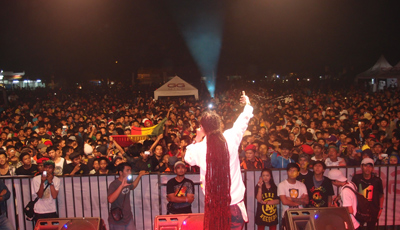 How will these new songs play into your set list? I would imagine you have a pretty big set of singles in your repertoire that you have to play every show and your fans expect them. How will you structure this set list with your new album?
How will these new songs play into your set list? I would imagine you have a pretty big set of singles in your repertoire that you have to play every show and your fans expect them. How will you structure this set list with your new album?
I have to prepare for that in the beginning of August, I kept thinking that a few months back like, ‘How are we going to fit this?’ Right now our set without the songs from this album is 15-16 songs and in about a 45 minute to one hour set we have to fit these brand new songs. It’s crazy, I guess its going to be a super-medley or something like that. When we are traveling, our administrator for our fan page, I ask them to ask what songs do they want, three choices of songs, so it goes by interaction with the fans. I try to keep a close fan base, I don’t see myself as a celebrity, I see myself as a musician.
What are your plans for this album, where do you hope to take this music going forward?
I sure would love to travel to Europe and the United States, touring the album in early 2015. That is one, and also showing something from Indonesia, what we are offering to the world. Because I am from Indonesia, I want to show people my experience and where we come from and hope the reception goes good. Cause right now I am very nervous about how people are going to receive it, especially someone coming from Asia. I can’t think of any Asian leading male that is taken seriously, besides Bruce Lee, besides in the martial arts. This is something serious, that is why I made it a point that the Salam album was going to be pure roots reggae, nothing gimmicky, not going to be a commodity it’s music, vibes, strength and the message. Many people’s world view of Islam could be somewhat negative. Something comes out like this, Indonesia being very populated with Muslims, that is why I chose the name Salam, its a greeting in Indonesian, but it also means peace. For the album cover I took a lot of Indonesian philosophy with the rice fields, also I am wearing batik around my shoulders, also you have the gunung, the mountains in the background, it’s pyramid-like. That symbolizes in the wayang (Indonesian shadow puppet theatre) where it is the next chapter. That mountain shape usually separates in the middle, and you are going on to the next chapter. It shows me that I am about to step into saying ‘Salam’ to the world from Indonesia.
What is your final message to the Reggaeville massive?
Keep supporting reggae music and reggae culture and keep spreading the reggae culture and music throughout the world, making it grow making it develop more and advance.




